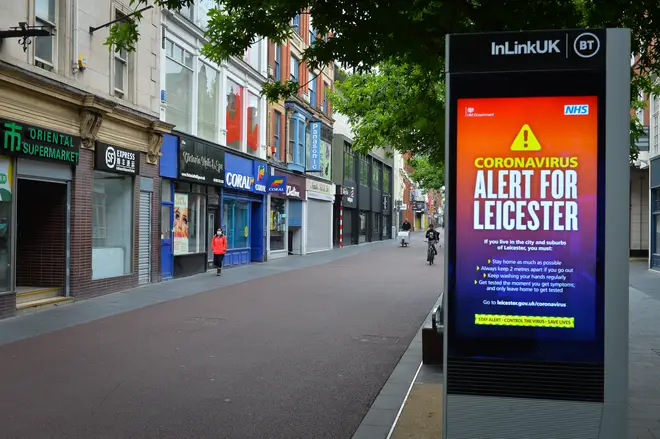
Clive Bull 1am - 4am
12 July 2020, 00:35

Ministers have drawn up a list of the 20 councils most in danger of coronavirus outbreaks, according to a leaked document.
A classified document leaked to the Observer and Guardian includes six areas of "concern", with three councils needing "enhanced support".
Officials have ordered the army to deploy extra mobile testing units to a series of hotspots around Britain from this weekend, the newspapers report.
It comes amid mounting fears of a second wave of coronavirus infections hitting the UK after lockdown was eased again last weekend.
Public Health England reportedly briefed Government health chiefs last week that ministers were considering publishing a list of 10 areas hit with outbreaks.
READ MORE: 73 workers at Herefordshire farm catch coronavirus following outbreak
READ MORE: Face masks 'should not be mandatory' in England's shops, says Michael Gove

Health Secretary Matt Hancock announces local lockdown in Leicester
Leicester tops the new list, requiring "intervention". The East Midlands city became the first to enter local lockdown after seeing nearly 900 cases in a fortnight.
The 19 other councils are ranked by the number of cases per 100,000 people and recent testing.
Kirklees and Bradford make up the top three behind Leicester, seeing 5% and 4.3% of tests returned as positive, compared to Leicester's 5.7%.
The two councils along with Sheffield are marked as needing "enhanced support".
Blackburn with Darwen in Lancashire is fourth highest, after the borough council warned residents that they could face a "Leicester-style" local lockdown if people do not follow the coronavirus guidelines.
The council, along with Rochdale, Oldham in Greater Manchester, Rotherham, Barnsley and Bedford were all flagged as areas of "concern".
The full list of 20 most at-risk areas:
1. Leicester
2. Kirklees
3. Bradford
4. Blackburn with Darwen
5. Oadby and Wigston
6. Rochdale
7. Ashford
8. Folkestone and Hythe
9. Blaby
10. Oldham
11. Rotherham
12. Barnsley
13. Bedford
14. Northampton
15. Sheffield
16. Bolton
17. Hinckley and Bosworth
18. Kettering
19. Knowsley
20. Carlisle
The leaked document says "these areas are currently under investigation by the local public health protection teams", according to the Guardian and Observer.
Bradford is said to have deployed mobile testing units, staffed by army personnel, in its Bowling and Keighley districts on Saturday, while Blackburn and Sheffield are expected to follow soon.
Read more: Madeleine McCann - Portuguese police search three wells for evidence
Read more: Labour boycotts Facebook amid Black Lives Matter protests

The document reportedly says testing access is "being increased in areas including Bradford", citing "workplace outbreaks which have contributed to the increase in infection rates".
Last month, 164 workers at a meat factory in Kirklees tested positive and a bed factory in Batley, regulated by Kirklees Council, was closed at the start of July after eight workers tested positive.
A public health director briefed on the plans told the two newspapers that the areas are "characterised by higher deprivation, higher black, Asian and minority ethnic (BAME) communities and denser housing".
A Department of Health and Social Care spokesperson told the papers: “We have been transparent about our response to coronavirus and are always looking to improve the data we publish, including the way we update testing statistics.
“The list of the 10 local authorities with the highest weekly incidence of coronavirus is already publicly available in PHE’s weekly surveillance report.
“All councils in England now have the ability to access testing data, right down to an individual and postcode level. If councils feel they require more assistance with data, of course, PHE is able to help them.”